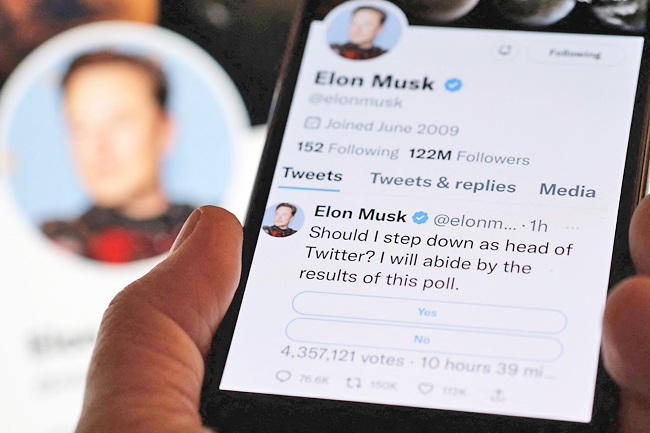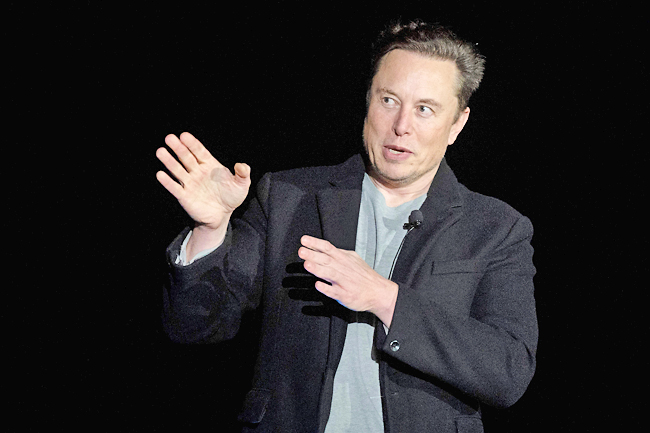SAN FRANCISCO (AFP) – Elon Musk appeared to put his future in charge of Twitter on the line, posting a poll asking whether he should step down and vowing to abide by the results.
“Should I step down as head of Twitter?” he tweeted, asking the site’s users to click yes or no. “I will abide by the results of this poll.”
With four hours until the end of the poll yesterday, 56.7 per cent of nearly 14 million respondents had voted yes.
In Twitter exchanges with followers, Musk said he did not have a replacement lined up.
“No one wants the job who can actually keep Twitter alive. There is no successor,” he said.
Making a “fun suggestion” to Musk, MIT research scientist Lex Fridman offered to run the platform for a bit for no salary.
In a downbeat response, Musk said Twitter was “in the fast lane to bankruptcy”.


“You must like pain a lot. One catch: you have to invest your life savings in Twitter and it has been in the fast lane to bankruptcy since May. Still want the job?” Musk asked.
The unpredictable billionaire posted the poll shortly after apparently acknowledging he had made a mistake banning Twitter users from promoting their accounts on rival social media platforms.
“Going forward, there will be a vote for major policy changes. My apologies. Won’t happen again,” he tweeted.
The sudden shift in the rules was the latest in a series of controversial changes made by Musk since he took over the company in October – upheaval that has led a growing number of users to encourage followers to view their posts on other sites.
Twitter had announced that the company would “no longer allow free promotion of specific social media platforms”.
Users would thus be barred, for example, from posting “Follow me @username on Instagram”, Twitter said.
Twitter co-founder Jack Dorsey questioned the new policy with a one-word tweet: “Why?”
After some notable accounts were suspended under the new policy, including tech investor Paul Graham, Musk tweeted that instead of considering individual tweets, the policy would be limited to “suspending accounts only when that account’s *primary* purpose is promotion of competitors”.
Musk has generated a series of controversies in his short tenure at the helm of Twitter, including layoffs, reinstatement of some far-right accounts and the suspension of several journalists. Shortly after taking over the platform, he announced the site would charge USD8 per month to verify account holders’ identities, but had to suspend the “Twitter Blue” plan after an embarrassing rash of fake accounts. It has since been relaunched.
On November 4, with Musk saying the company was losing USD4 million a day, Twitter laid off half its 7,500-strong staff.
Musk also reinstated the account of former president Donald Trump and said Twitter would no longer work to combat COVID-19 disinformation.
In recent days, he suspended the accounts of several journalists – most recently, Washington Post reporter Taylor Lorenz – after complaining some had divulged details about the movements of his private jet that could endanger his family.
The suspension of the journalists – employees of CNN, The New York Times and The Washington Post were among those affected – has drawn sharp criticism, including from the European Union and the United Nations.
The US Federal Trade Commission said it was tracking developments at Twitter “with deep concern.”
The Washington Post’s executive editor Sally Buzbee said the suspension of Lorenz’s account “further undermines Elon Musk’s claim that he intends to run Twitter as a platform dedicated to free speech.”


